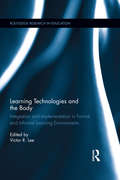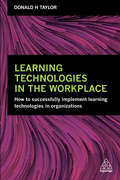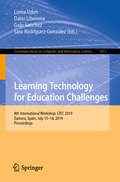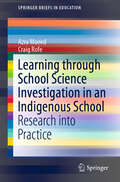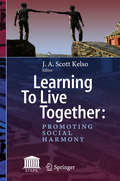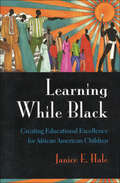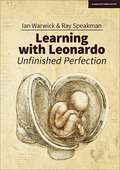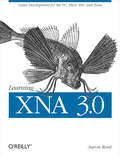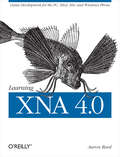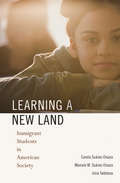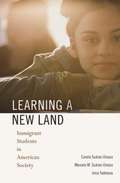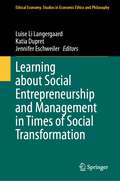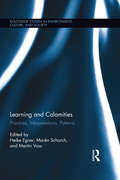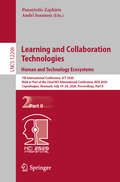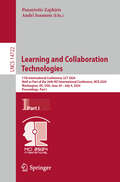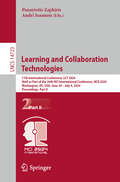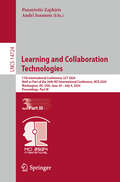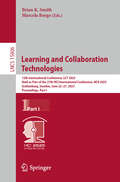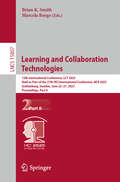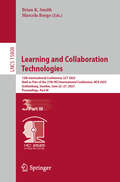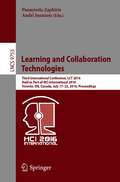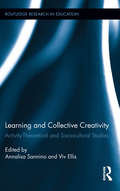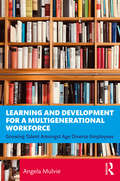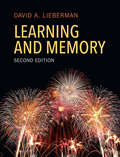- Table View
- List View
Learning Technologies and the Body: Integration and Implementation In Formal and Informal Learning Environments (Routledge Research in Education #135)
by Victor R. LeeThis volume explores how technology-supported learning environments can incorporate physical activity and interactive experiences in formal education. It presents cutting-edge research and design work on a new generation of "body-centric" technologies such as wearable body sensors, GPS tracking devices, interactive display surfaces, video game controller devices, and humanlike avatars. Contributors discuss how and why each of these technologies can be used in service of learning within K-12 classrooms and at home, in museums and online. Citing examples of empirical evidence and specific implementation, this timely and critical volume examines how body responsive technologies are being used within the educational community to advance the next generation of educational technology.
Learning Technologies in the Workplace: How to Successfully Implement Learning Technologies in Organizations
by Donald H TaylorKnowledge was once power - difficult to find, slow to transmit and coveted. Now we can access almost the sum total of human information with a swipe of our thumbs. The impact on the knowledge economy has been vast, leaving learning and development (L&D) professionals wondering how to keep pace. Many organizations naturally turn to technology to ensure workplace learning at scale and at speed, but stumble when it comes to successfully deploying and using it. Learning Technologies in the Workplace examines 16 years of learning technology implementations to find the secrets behind the most successful.Examples in the book from the Hershey Company and BP, airlines, tech companies and manufacturers point to four common factors. Successful learning technology teams all have APPA: a clear aim, a people focus, a wide perspective and a pragmatic, can-do attitude. Learning Technologies in the Workplace gives readers practical pointers for each of these four points, helping them implement and use learning technologies well, with particular emphasis on the essential skill of identifying stakeholders and winning their support.
Learning Technology for Education Challenges: 8th International Workshop, LTEC 2019, Zamora, Spain, July 15–18, 2019, Proceedings (Communications in Computer and Information Science #1011)
by Lorna Uden Dario Liberona Galo Sanchez Sara Rodríguez-GonzálezThis book constitutes the refereed proceedings of the 8th International Workshop on Learning Technology for Education Challenges, LTEC 2019, held in Zamora, Spain, in July 2019.The 41 revised full papers presented were carefully reviewed and selected from 83 submissions. The papers are organized in the following topical sections: learning technolgies; learning tools and environment; e-learning and MOOCs; learning practices; social media learning tools; machine learning and evaluation support programs. LTEC 2019 examines how these technologies and pedagogical advances can be used to change the way teachers teach and students learn, while giving special emphasis to the pedagogically effective ways we can harness these new technologies in education.
Learning Through School Science Investigation in an Indigenous School: Research into Practice (SpringerBriefs in Education)
by Azra Moeed Craig RofeThis book presents the findings of a case study conducted in a Māori medium school where a space was created for Pūtaiao (Western science) teaching and learning from year 1 to 13. Science is currently taught in Te Reo Māori in primary school and in English in secondary school, and evidence suggests that students are engaging in science education, learning to investigate, and achieving in science. In New Zealand, most students attend English medium state schools; however, approximately 15% of indegenous students attend Māori medium schools. These schools are underpinned with Kura Kaupapa Māori philosophy, which is culturally specific to Māori and aims to revitalise the Māori language, and Māori knowledge and culture. Māori students’ engagement and achievement continues to be a challenge for both mainstream and Māori medium schools, teachers and students due to lack of access to science teachers who can teach in Te Reo Māori. School leaders and whanau (families) believed that by year 9 (age 13) their students had developed their identity as Māori, and were proficient in Te Reo Māori. They wanted their students to have the option to learn science, experience success and have the choice to conitnue in science, so they made the difficult decision for science to be taught in English in secondary school. The book discusses how teachers in indigenous schools, who have extensive knowledge of culture and context specific pedagogies, can gain confidence to teach science through collaboration with and support from researchers with whom they have developed strong professional relationships.
Learning To Live Together: Promoting Social Harmony
by J. A. Scott KelsoThis book is devoted to the issue of how we can learn to live together in the face of division and conflict. It is dedicated to the life and work of a remarkable human being, Dr Epimenidis Haidemenakis, scientist, statesman, visionary leader, President Emeritus of the International S.T.E.P.S. Foundation and founding father of The Olympiads of the Mind (OM). The monograph consists of a collection of papers presented at the 8th and 9th Olympiads of the Mind held in Washington, DC and Chania, Crete respectively. Distinguished international scholars, government and corporate representatives, leading researchers and academics from multiple disciplines and Nobel Laureates Leon Lederman (Physics, 1988), Martin Perl (Physics, 1995) and Yuan T. Lee (Chemistry, 1986) address a broad range of issues all with the aim of improving the human condition and achieving cooperation among the people of the world. The topics include the environment, sustainability and security; diversity and how to achieve integration and peace among people in a fractured world; the important role of brain research; how to overcome poverty and inequality; how to enhance creativity and improve education at all levels; and how new technologies and tools can be used for common benefit. The culmination of the book is a call to action, to join what one might call the “OM Movement”—bringing the best minds in the world together to create solutions to world issues so that we can all live together in harmony.
Learning While Black: Creating Educational Excellence for African American Children
by Janice E. HaleIn Learning While Black Janice Hale argues that educators must look beyond the cliches of urban poverty and teacher training to explain the failures of public education with regard to black students. Why, Hale asks simply, are black students not being educated as well as white students? Hale goes beyond finger pointing to search for solutions. Closing the achievement gap of African American children, she writes, does not involve better teacher training or more parental involvement. The solution lies in the classroom, in the nature of the interaction between the teacher and the child. And the key, she argues, is the instructional vision and leadership provided by principals. To meet the needs of diverse learners, the school must become the heart and soul of a broad effort, the coordinator of tutoring and support services provided by churches, service clubs, fraternal organizations, parents, and concerned citizens. Calling for the creation of the "beloved community" envisioned by Dr. Martin Luther King, Jr., Hale outlines strategies for redefining the school as the Family, and the broader community as the Village, in which each child is too precious to be left behind. "In this book, I am calling for the school to improve traditional instructional practices and create culturally salient instruction that connects African American children to academic achievement. The instruction should be so delightful that the children love coming to school and find learning to be fun and exciting."—Janice Hale
Learning With Leonardo: Unfinished Perfection: Making children cleverer: what does Da Vinci tell us?
by Ian Warwick Ray SpeakmanWhat are the seven key concepts that drove Da Vinci's inventive thinking and how can we still use them to improve our own creativity, 500 years after his death? In pursuit of the unified learning principles that sit at the heart of his work, Ian Warwick and Ray Speakman brilliantly explore the approaches that we need to take to make our own learning more original and thoughtful.
Learning With Leonardo: Unfinished Perfection: Making children cleverer: what does Da Vinci tell us?
by Ian Warwick Ray SpeakmanWhat are the seven key concepts that drove Da Vinci's inventive thinking and how can we still use them to improve our own creativity, 500 years after his death? In pursuit of the unified learning principles that sit at the heart of his work, Ian Warwick and Ray Speakman brilliantly explore the approaches that we need to take to make our own learning more original and thoughtful.
Learning XNA 3.0: XNA 3.0 Game Development for the PC, Xbox 360, and Zune
by Aaron ReedDo you have what it takes to become a game developer? With this hands-on book, you'll learn quickly and easily how to develop computer games with Microsoft's XNA 3.0 framework-not just for your PC, but for Xbox 360 and the Microsoft Zune as well. Written by an experienced university-level game development instructor, Learning XNA 3.0 walks you through the framework in a clear and understandable step-by-step format. Each chapter offers a self-contained lesson with lots of illustrations and annotated examples to help you master key concepts. Once you finish the book, you'll know how to develop sophisticated games from start to finish.Learn game development concepts from 2D animation to 3D cameras and effectsDelve into high-level shader language (HLSL) and introductory artificial intelligence conceptsDevelop three complete and exciting games using 2D,3D and multiplayer conceptsDevelop and deploy games to the Xbox 360 and the Microsoft ZuneWhile teaching XNA to beginning game developers, author Aaron Reed noticed that several key concepts were difficult for students to grasp. Learning XNA 3.0 was written specifically to address those issues. With this book, you can test your understanding and practice new skills as you go with unique "Test Your Knowledge" exercises and review questions in each chapter. Why wait? Amaze your family and friends by building your own games for the PC, Xbox 360, and Zune-with Learning XNA 3.0."An outstanding book! Teaches you XNA development in a smart way, starting from 2D basics and going into 3D and shader development. What I really like is the 'peeling the onion' approach the author takes, which builds up knowledge from previous chapters."--David "LetsKillDave" Weller, CEO, Cogito Ergonomics, LLC, and former XNA program manager
Learning XNA 4.0: Game Development for the PC, Xbox 360, and Windows Phone 7
by Aaron ReedWant to develop games for Xbox 360 and Windows Phone 7? This hands-on book will get you started with Microsoft's XNA 4.0 development framework right away -- even if you have no experience developing games. Although XNA includes several key concepts that can be difficult for beginning web developers to grasp, Learning XNA 4.0 shortens the learning curve by walking you through the framework in a clear and understandable step-by-step format.Each chapter offers a self-contained lesson with illustrations and annotated examples, along with exercises and review questions to help you test your understanding and practice new skills as you go. Once you've finished this book, you'll know how to develop your own sophisticated games from start to finish.Learn game development from 2D animation to 3D cameras and effectsDelve into high-level shader language (HLSL) and introductory artificial intelligence conceptsBuild three complete, exciting games using 2D, 3D, and multiplayer techniquesDevelop for and deploy your games to the Xbox 360 and Windows Phone 7
Learning a New Land: Immigrant Students in American Society
by Carola Suárez-Orozco Irina Todorova Marcelo M. Suárez-OrozcoOne child in five in America is the child of immigrants, and their numbers increase each year. Very few will return to the country they barely remember. Who are they, and what America do they know? Based on an extraordinary interdisciplinary study that followed 400 newly arrived children from the Caribbean, China, Central America, and Mexico for five years, this book provides a compelling account of the lives, dreams, and frustrations of these youngest immigrants. Richly told portraits of high and low achievers are packed with unexpected ironies. When they arrive, most children are full of optimism and a respect for education. But poor neighborhoods and dull--often dangerous--schools can corrode hopes. The vast majority learn English--but it is the English of video games and the neighborhood, not that of standardized tests. For some of these children, those heading off to college, America promises to be a land of dreams. These lucky ones have often benefited from caring mentors, supportive teachers, or savvy parents. For others, the first five years are marked by disappointments, frustrations, and disenchantment. How can we explain their varied academic journeys? The children of immigrants, here to stay, are the future--and how they adapt will determine the nature of America in the twenty-first century.
Learning a New Land: Immigrant Students in American Society, First Edition
by Marcelo M. Suarez-Orozco Carola Suarez-Orozco Irina TodorovaBased on an extraordinary interdisciplinary study that followed 400 newly arrived children from the Caribbean, China, Central America, and Mexico for five years, this book provides a compelling account of the lives, dreams, and frustrations of these youngest immigrants. Richly told portraits of high and low achievers are packed with unexpected ironies. When they arrive, most children are full of optimism and a respect for education. But poor neighborhoods and dull--often dangerous--schools can corrode hopes. The vast majority learn English--but it is the English of video games and the neighborhood, not that of standardized tests.
Learning about Social Entrepreneurship and Management in Times of Social Transformation (Ethical Economy #66)
by Luise Li Langergaard Katia Dupret Jennifer EschweilerThe book brings together perspectives on entrepreneurship research, education and practice to understand social entrepreneurship in its wider societal, political and economic context. Its unique contribution comes from its interdisciplinary approach that spans from the societal to the organizational level, with specific focus social innovation and management. It views management of social entrepreneurship and social enterprise in light of its societal context and employs social innovation to critically assess social entrepreneurship as driver of change. The emergence of social entrepreneurship as an academic field is linked to several societal trends such as public austerity, financial crises, new social challenges and a growing counter-movement to globalised capitalism. Generally seen as organisations serving both social and economic objectives, social enterprises, social innovation and social entrepreneurship have their roots in civil society, civic activism or the solidarity economy, but also manifest themselves as for-profit companies, with new organisational forms emerging and old ones changing. The contributions in this book elucidate these developments and the role of social entrepreneurs and social enterprises. Furthermore, the book offers great insight into the specific ways of managing, leading and creating innovation in social enterprises as well as perspectives on how to understand their social impact or value creation.
Learning and Calamities: Practices, Interpretations, Patterns (Routledge Studies in Environment, Culture, and Society #3)
by Heike Egner Marén Schorch Martin VossIt is widely assumed that humanity should be able to learn from calamities (e.g., emergencies, disasters, catastrophes) and that the affected individuals, groups, and enterprises, as well as the concerned (disaster-) management organizations and institutions for prevention and mitigation, will be able to be better prepared or more efficient next time. Furthermore, it is often assumed that the results of these learning processes are preserved as "knowledge" in the collective memory of a society, and that patterns of practices were adopted on this base. Within history, there is more evidence for the opposite: Analyzing past calamities reveals that there is hardly any learning and, if so, that it rarely lasts more than one or two generations. This book explores whether learning in the context of calamities happens at all, and if learning takes place, under which conditions it can be achieved and what would be required to ensure that learned cognitive and practical knowledge will endure on a societal level. The contributions of this book include various fields of scientific research: history, sociology, geography, psychoanalysis, psychiatry, development studies and political studies, as well as disaster research and disaster risk reduction research.
Learning and Collaboration Technologies. Human and Technology Ecosystems: 7th International Conference, LCT 2020, Held as Part of the 22nd HCI International Conference, HCII 2020, Copenhagen, Denmark, July 19–24, 2020, Proceedings, Part II (Lecture Notes in Computer Science #12206)
by Panayiotis Zaphiris Andri IoannouThis two-volume set LNCS 12205 and LNCS 12206 constitutes the proceedings of the 7th International Conference on Learning and Collaboration Technologies, LCT 2020, held as part of the 22nd International Conference, HCI International 2020, which took place in Copenhagen, Denmark, in July 2020.The total of 1439 papers and 238 posters included in the 37 HCII 2020 proceedings volumes was carefully reviewed and selected from 6326 submissions.The papers in this volume are organized in the following topical sections: communication and conversation in learning; cognition, emotions and learning; games and gamification in learning; VR, robot and IoT in learning; and collaboration technology and collaborative learning. As a result of the Danish Government's announcement, dated April 21, 2020, to ban all large events (above 500 participants) until September 1, 2020, the HCII 2020 conference was held virtually.
Learning and Collaboration Technologies: 11th International Conference, LCT 2024, Held as Part of the 26th HCI International Conference, HCII 2024, Washington, DC, USA, June 29–July 4, 2024, Proceedings, Part I (Lecture Notes in Computer Science #14722)
by Panayiotis Zaphiris Andri IoannouThis three-volume set LNCS 14722-14724 constitutes the thoroughly refereed proceedings of the 11th International Conference, LCT 2024, held as part of the 26th International Conference on Human-Computer Interaction, HCI International 2024 (HCII 2024), was held as a hybrid event in Washington DC, USA, during June/July 2024. The total of 1271 papers and 309 posters included in the HCII 2023 proceedings was carefully reviewed and selected from 5108 submissions. The LCT 2024 conference addresses theoretical foundations, design, and implementation, as well as effectiveness and impact issues related to interactive technologies for learning and collaboration, including design methodologies, developments and tools, theoretical models, learning design or learning experience (LX) design, as well as technology adoption and use in formal, non-formal and informal educational contexts.
Learning and Collaboration Technologies: 11th International Conference, LCT 2024, Held as Part of the 26th HCI International Conference, HCII 2024, Washington, DC, USA, June 29–July 4, 2024, Proceedings, Part II (Lecture Notes in Computer Science #14723)
by Panayiotis Zaphiris Andri IoannouThis three-volume set LNCS 14722-14724 constitutes the thoroughly refereed proceedings of the 11th International Conference, LCT 2024, held as part of the 26th International Conference on Human-Computer Interaction, HCI International 2024 (HCII 2024), was held as a hybrid event in Washington DC, USA, during June/July 2024. The total of 1271 papers and 309 posters included in the HCII 2023 proceedings was carefully reviewed and selected from 5108 submissions. The LCT 2024 conference addresses theoretical foundations, design, and implementation, as well as effectiveness and impact issues related to interactive technologies for learning and collaboration, including design methodologies, developments and tools, theoretical models, learning design or learning experience (LX) design, as well as technology adoption and use in formal, non-formal and informal educational contexts.
Learning and Collaboration Technologies: 11th International Conference, LCT 2024, Held as Part of the 26th HCI International Conference, HCII 2024, Washington, DC, USA, June 29–July 4, 2024, Proceedings, Part III (Lecture Notes in Computer Science #14724)
by Panayiotis Zaphiris Andri IoannouThis three-volume set LNCS 14722-14724 constitutes the thoroughly refereed proceedings of the 11th International Conference, LCT 2024, held as part of the 26th International Conference on Human-Computer Interaction, HCI International 2024 (HCII 2024), was held as a hybrid event in Washington DC, USA, during June/July 2024. The total of 1271 papers and 309 posters included in the HCII 2023 proceedings was carefully reviewed and selected from 5108 submissions. The LCT 2024 conference addresses theoretical foundations, design, and implementation, as well as effectiveness and impact issues related to interactive technologies for learning and collaboration, including design methodologies, developments and tools, theoretical models, learning design or learning experience (LX) design, as well as technology adoption and use in formal, non-formal and informal educational contexts.
Learning and Collaboration Technologies: 12th International Conference, LCT 2025, Held as Part of the 27th HCI International Conference, HCII 2025, Gothenburg, Sweden, June 22–27, 2025, Proceedings, Part I (Lecture Notes in Computer Science #15806)
by Brian K. Smith Marcela BorgeThe three-volume set LNCS 15806–15808 constitutes the thoroughly refereed proceedings of the 12th International Conference on Learning and Collaboration Technologies, LCT 2025, held as part of the 27th International Conference, HCI International 2025, which took place in Gothenburg, Sweden, June 22-17, 2025. The total of 1430 papers and 355 posters included in the HCII 2025 proceedings was carefully reviewed and selected from 7972 submissions. The papers have been organized in topical sections as follows: Part I: Designing Learning Experiences; Technological Innovation in EducationPart II: From Human Teachers to AI Educators; Intelligent Learning Environments Part III: Serious Games and Gamification; Immersive Learning; Understanding Learning Experiences
Learning and Collaboration Technologies: 12th International Conference, LCT 2025, Held as Part of the 27th HCI International Conference, HCII 2025, Gothenburg, Sweden, June 22–27, 2025, Proceedings, Part II (Lecture Notes in Computer Science #15807)
by Brian K. Smith Marcela BorgeThe three-volume set LNCS 15806–15808 constitutes the thoroughly refereed proceedings of the 12th International Conference on Learning and Collaboration Technologies, LCT 2025, held as part of the 27th International Conference, HCI International 2025, which took place in Gothenburg, Sweden, June 22-17, 2025. The total of 1430 papers and 355 posters included in the HCII 2025 proceedings was carefully reviewed and selected from 7972 submissions. The papers have been organized in topical sections as follows: Part I: Designing Learning Experiences; Technological Innovation in EducationPart II: From Human Teachers to AI Educators; Intelligent Learning Environments Part III: Serious Games and Gamification; Immersive Learning; Understanding Learning Experiences
Learning and Collaboration Technologies: 12th International Conference, LCT 2025, Held as Part of the 27th HCI International Conference, HCII 2025, Gothenburg, Sweden, June 22–27, 2025, Proceedings, Part III (Lecture Notes in Computer Science #15808)
by Brian K. Smith Marcela BorgeThe three-volume set LNCS 15806–15808 constitutes the thoroughly refereed proceedings of the 12th International Conference on Learning and Collaboration Technologies, LCT 2025, held as part of the 27th International Conference, HCI International 2025, which took place in Gothenburg, Sweden, June 22-17, 2025. The total of 1430 papers and 355 posters included in the HCII 2025 proceedings was carefully reviewed and selected from 7972 submissions. The papers have been organized in topical sections as follows: Part I: Designing Learning Experiences; Technological Innovation in EducationPart II: From Human Teachers to AI Educators; Intelligent Learning Environments Part III: Serious Games and Gamification; Immersive Learning; Understanding Learning Experiences
Learning and Collaboration Technologies: Third International Conference, LCT 2016, Held as Part of HCI International 2016, Toronto, ON, Canada, July 17-22, 2016, Proceedings (Lecture Notes in Computer Science #9753)
by Panayiotis Zaphiris Andri IoannouThis book constitutes the refereed proceedings of the Third International Conference on Learning and Collaboration Technologies, LCT 2016, held as part of the 18th International Conference on Human-Computer Interaction, HCII 2016, in Toronto, Canada, in July 2016, in conjunction with 14 thematically similar conferences. The 1287 papers presented at the HCII 2016 conferences were carefully reviewed and selected from 4354 submissions. The papers cover the entire field of human-computer interaction, addressing major advances in knowledge and effective use of computers in a variety of application areas. The papers included in this volume are organized in the following thematic sections: instructional design; interaction techniques and platforms for learning; learning performance; web-based, mobile and ubiquitous learning; intelligent learning environments; learning technologies; collaboration technologies; and cultural and social aspects of learning and collaboration technologies.
Learning and Collective Creativity: Activity-Theoretical and Sociocultural Studies (Routledge Research in Education)
by Viv Ellis Annalisa SanninoThis book brings together leading representatives of activity-theoretically-oriented and socioculturally-oriented research around the world, to discuss creativity as a collective endeavour strongly related to learning to face the societal challenges of our world. As history shows, major accomplishments in arts and technological innovations have allowed us to see the world differently and to identify new learning perspectives for the future which were seldom limited to individual action or isolated activities. This book, while primarily focused on educational insitutions, extends its examination of creativity and learning to include other settings (such as government agencies) beyond the limits of schooling.
Learning and Development for a Multigenerational Workforce: Growing Talent Amongst Age Diverse Employees
by Angela MulvieAs the topic of age diversity in the workplace becomes increasingly important, this book is the first to show how organizations can provide learning and development opportunities and activities for a mixed generational workforce, and how to deal with the issues arising from such a strategy. Going beyond the theory, the book uncovers how learning and development for a multigenerational workforce works in practice and provides case studies throughout. Key themes include: • how organizations can determine the learning and development needs of a multigenerational workforce, and the psychology of learning for different groups; • how a strategy for learning and development for a mixed generation workforce can be established and delivered; • the resource implications of this provision and how organisations dealing with them to ensure flexibility; and • how the outcomes and impact of such provision can be measured. With both research-based and practical content, the book is suitable for both Master’s level programmes in HRM and HRD, and for learning and development professionals.
Learning and Memory: An Integrative Approach
by David A. LiebermanThe first text to integrate behavioral and cognitive approaches to learning and memory, this engaging textbook emphasizes human research, reflecting the field's evolution. Learning and Memory also recognizes the vital contribution of animal research, covering all historically important studies. Written in a lively and conversational style, this second edition encourages students to think critically. One example is its exploration of the Rescorla-Wagner model, the most important theory of conditioning, now further streamlined to improve student comprehension. Another is the addition of critical-thinking questions, which encourage students to evaluate their reactions to the material they've read, and relate findings to their own lives. Research includes an emphasis on practical applications such as treatments for phobias, addictions, and autism; the arguments for and against corporal punishment; whether recovered memories and eyewitness testimony should be believed; and effective techniques for studying. The text concludes with an overview of neural networks and deep learning.
